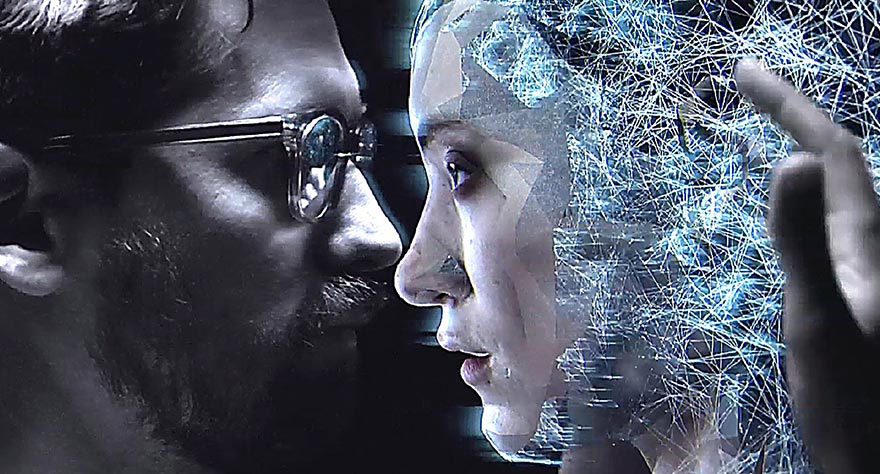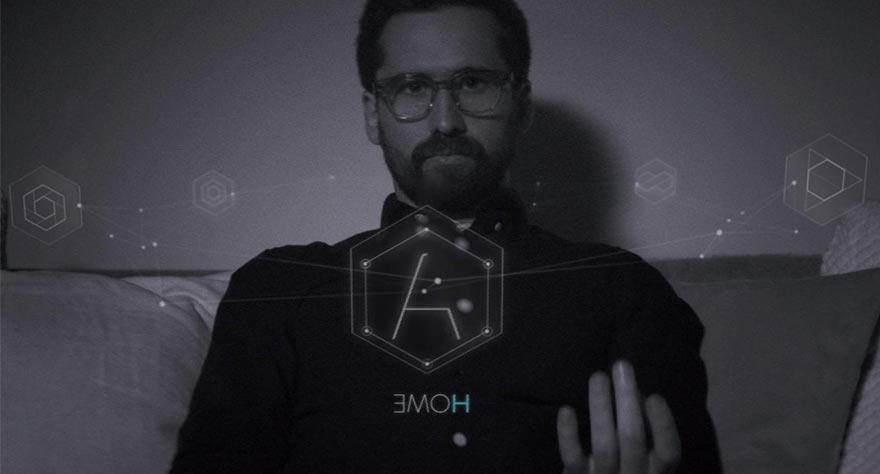
A sharp looking dark comedy showcasing a technological future filled with people we already know and hate.

A sharp looking dark comedy showcasing a technological future filled with people we already know and hate.
In the constant upswing that is the age of digital innovation, there’s hardly a technological advancement portrayed on film that doesn’t seem moments from reality. Benjamin Dickinson’s Creative Control feels so near to today’s level of digital immersion, one has to wonder if some tech company isn’t using him to sneak-peak their product. Creative Control’s five-minutes-from-now future depicts a black and white filmed Brooklyn and the creative professionals who occupy it. The film follows David (Benjamin Dickinson also plays lead), a marketing professional pitching a new client on how to release their product. The product is Augmenta, a pair of glasses—hipster in design—that bring the virtual world and the real world together allowing a person to be almost constantly plugged in. In this near-future phones look like iPhones but see-through, finger movements across a desktop work in lieu of keyboards, and with the glasses on one could technically be working on as many things at once as they want.
Creative Control’s focus is oddly far less on technology and more on the enhanced ways technology allows an already emotionally unintelligent and self-absorbed yuppie to spiral further into self-destructive tendencies. Unfortunately, the crystallized mechanics of this classic music dubbed, slow-motion filled revery reduce down to beautiful packaging on a boring operating system.
Dickinson gently pokes fun at the creative class of New York City with his film’s opening. David helps his boss who can’t figure out his phone as they wait for their new clients then delivers a cocky modern pitch to Augmenta’s creator Gabe (Jake Lodwick, the real-life creator of Vimeo) suggesting they use a technologically-hip and out of the box artist to use the glasses to create his art, giving the product some needed street-cred. The techno-artist in question is Reggie Watts (playing a stylized version of himself and by far the film’s strongest comedic relief) and his out there, existential, video-making is an edgy risk. David’s risk is a success, the client approves and he gets his own pair of Augmenta glasses, he texts his girlfriend about his victory. His girlfriend, Juliette (Nora Zehetner), is a yoga instructor and her personality would appear in stark contrast to David’s, all naturalistic and socially minded, spending her weekends at hippie communes teaching yoga. But as the film continues it’s clear they are both consumers of modern popular theologies, he gets lost in his technology, she looks for escape in something resembling mindfulness, both accomodated by contemporary entitlement.
David’s best friend is Wim (Dan Gill), a modern asshole photographer surrounded by models and unabashed in his infidelities. His girlfriend, Sophie (Alexia Rasmussen), is another struggling artist, flirty and cute. David’s interest in her is obvious from the start, especially as he proceeds to find her a job at his company. She’s the first face his pair of Augmenta glasses see and David starts to use the glasses to create a virtual version of her. One night after a work event hosted by Reggie and fueled by psychedelic drugs, David walks Sophie home and ends up kissing her. They continue to flirt at the office. He and Juliette have a fight one evening, each taking jabs at the others values and judging their varied consumption of the mumbo-jumbo they’ve bought into. Juliette worries about the materials used to create Augmenta and the social conscience of the company. David criticizes her lack of a real job and constant need to focus on the world’s problems without offering solutions. He moves into a hotel and almost immediately tries to get Sophie to join him. She won’t, and his obsession with her grows and his virtual version of her gets more and more lifelike. Her digital avatar is a fine piece of special effects, distinctive from the rest of David’s world by being the only thing of color in the film.
From here relationship issues and career problems gather and gather crushing down on David’s growing obsessiveness and inability to focus on real life. Unfortunately, the more interesting angle would be to blame Augmenta and the virtual escape David uses it for, except that everything that ends up pushing David to his ho-hum conclusion is entirely to do with douche-y things he was likely to do anyway. From the film’s start, his inappropriate interest in Sophie is evident and there isn’t a single scene showcasing David being anything but a horrible boyfriend. It’s nice to know that even in this near-future the emotionally stunted and self-involved get their self-inflicted due. But the complete miss on an opportunity to delve into how virtual technology could create new possibilities, even new possibilities for douchebaggery, is just too transparent here. Like buying a huge chandelier and putting it in the guest bathroom.

Adam Newport-Berra’s cinematography is flawless, possibly even to the point of accenting the film’s story flaws. Depth of field can be made with a camera, depth of story cannot. The special effects blend seamlessly and are both subtle and enviable, this isn’t a future that is all that fear-inducing, it’s just close enough to the next step in technology some might find themselves wondering when we’ll get to try these things out for ourselves. Every other scene seems to include slow motion and classical music, a ploy that at first gives the movie an abstract sort of gravitas and then quickly becomes a worn out gimmick, though if it’s meant to accentuate David’s ridiculousness it’s not entirely unsuccessful.
It’s obvious that several of the film’s characters aren’t played by experienced actors such as Vice’s Gavin MacInnes as David’s boss, or Himanshu “Heems” Suri as David’s co-worker Reny, and even though Reggie Watts often plays some version of himself, even he could have gone bigger, though I will say they do bring a strange sort of natural element that feels weird enough to fit in. Dan Gill’s Wim is the most engaging to watch, owning his asshole-ish nature and being the most realistic in his use of the technology surrounding him. In one scene he sends David a video of himself having sex with Sophie, a natural sort of evolutionary upgrade on the classic dick pic that is both hilarious and ringing with truth. Nora Zehetner is well cast with her naively large eyes and sweet disposition, but Juliette is the most cartoonish of all the characters, given almost no realistic motivation for why she’d even be with a man like David or how it is she ends up on the path she takes in the film. It rather feels like another portrayal of a woman driven entirely by the men surrounding her.
In the end, Creative Control feels like a product of the introspective creative types it thinks its analyzing and breaking down. Unlike Spike Jonze’s Her, which also proffered a world where the technology feels imminent but with possible outcomes not yet explored, Creative Control neglects its primary plot device for its characters. Which wouldn’t be so bad, except that it’s not doing anything original with those characters. High-strung creative narcissists are gonna be self-destructive unless stopped by something, and Dickinson gives us nothing but the inevitable. Which leaves us with a sharp-looking future projection of people we already know and hate.